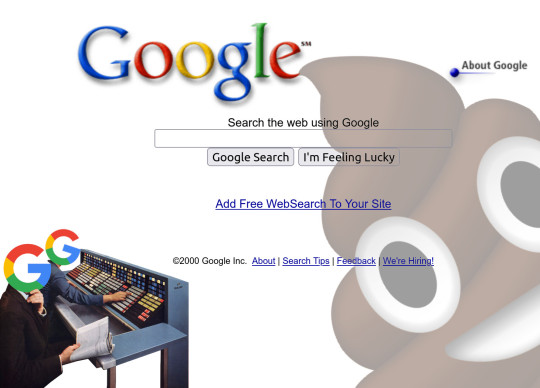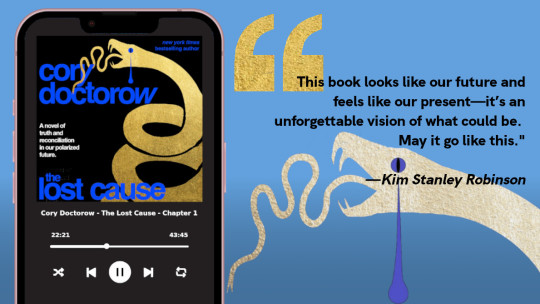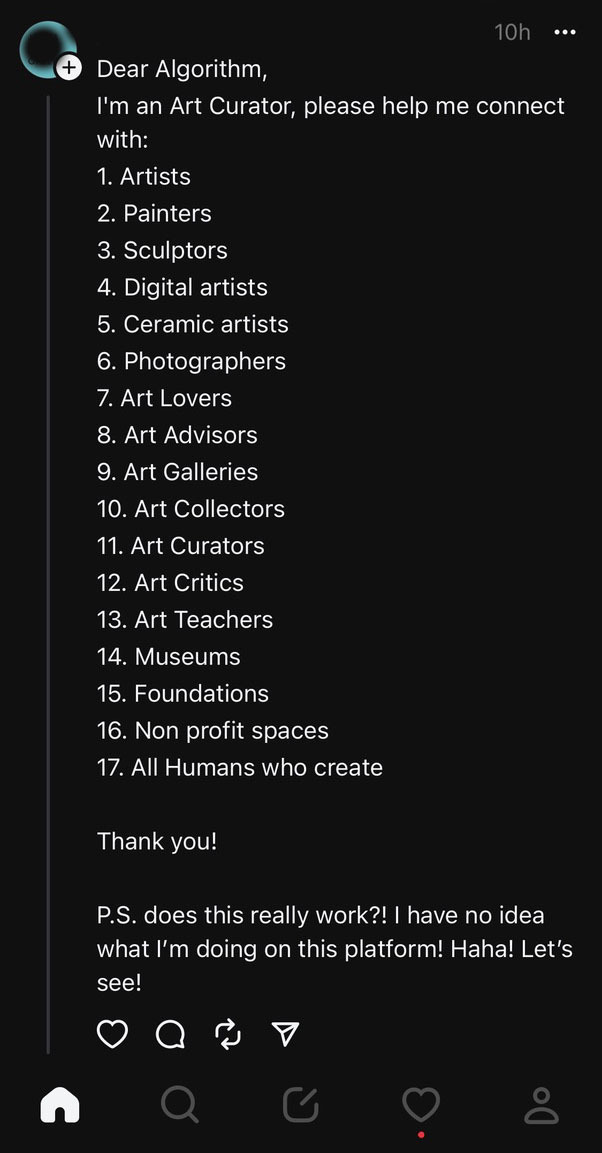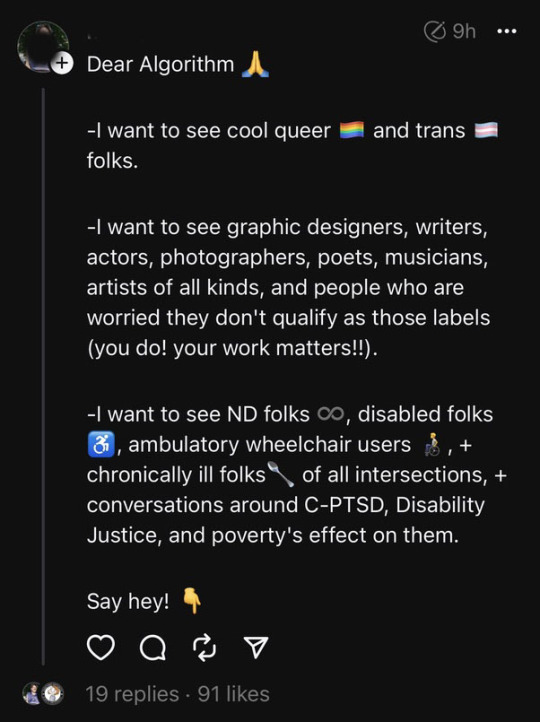#The algorithm
Text
Google’s enshittification memos

[Note, 9 October 2023: Google disputes the veracity of this claim, but has declined to provide the exhibits and testimony to support its claims. Read more about this here.]

When I think about how the old, good internet turned into the enshitternet, I imagine a series of small compromises, each seemingly reasonable at the time, each contributing to a cultural norm of making good things worse, and worse, and worse.
Think about Unity President Marc Whitten's nonpology for his company's disastrous rug-pull, in which they declared that everyone who had paid good money to use their tool to make a game would have to keep paying, every time someone downloaded that game:
The most fundamental thing that we’re trying to do is we’re building a sustainable business for Unity. And for us, that means that we do need to have a model that includes some sort of balancing change, including shared success.
https://www.wired.com/story/unity-walks-back-policies-lost-trust/
"Shared success" is code for, "If you use our tool to make money, we should make money too." This is bullshit. It's like saying, "We just want to find a way to share the success of the painters who use our brushes, so every time you sell a painting, we want to tax that sale." Or "Every time you sell a house, the company that made the hammer gets to wet its beak."
And note that they're not talking about shared risk here – no one at Unity is saying, "If you try to make a game with our tools and you lose a million bucks, we're on the hook for ten percent of your losses." This isn't partnership, it's extortion.
How did a company like Unity – which became a market leader by making a tool that understood the needs of game developers and filled them – turn into a protection racket? One bad decision at a time. One rationalization and then another. Slowly, and then all at once.
When I think about this enshittification curve, I often think of Google, a company that had its users' backs for years, which created a genuinely innovative search engine that worked so well it seemed like *magic, a company whose employees often had their pick of jobs, but chose the "don't be evil" gig because that mattered to them.
People make fun of that "don't be evil" motto, but if your key employees took the gig because they didn't want to be evil, and then you ask them to be evil, they might just quit. Hell, they might make a stink on the way out the door, too:
https://theintercept.com/2018/09/13/google-china-search-engine-employee-resigns/
Google is a company whose founders started out by publishing a scientific paper describing their search methodology, in which they said, "Oh, and by the way, ads will inevitably turn your search engine into a pile of shit, so we're gonna stay the fuck away from them":
http://infolab.stanford.edu/pub/papers/google.pdf
Those same founders retained a controlling interest in the company after it went IPO, explaining to investors that they were going to run the business without having their elbows jostled by shortsighted Wall Street assholes, so they could keep it from turning into a pile of shit:
https://abc.xyz/investor/founders-letters/ipo-letter/
And yet, it's turned into a pile of shit. Google search is so bad you might as well ask Jeeves. The company's big plan to fix it? Replace links to webpages with florid paragraphs of chatbot nonsense filled with a supremely confident lies:
https://pluralistic.net/2023/05/14/googles-ai-hype-circle/
How did the company get this bad? In part, this is the "curse of bigness." The company can't grow by attracting new users. When you have 90%+ of the market, there are no new customers to sign up. Hypothetically, they could grow by going into new lines of business, but Google is incapable of making a successful product in-house and also kills most of the products it buys from other, more innovative companies:
https://killedbygoogle.com/
Theoretically, the company could pursue new lines of business in-house, and indeed, the current leaders of companies like Amazon, Microsoft and Apple are all execs who figured out how to get the whole company to do something new, and were elevated to the CEO's office, making each one a billionaire and sealing their place in history.
It is for this very reason that any exec at a large firm who tries to make a business-wide improvement gets immediately and repeatedly knifed by all their colleagues, who correctly reason that if someone else becomes CEO, then they won't become CEO. Machiavelli was an optimist:
https://pluralistic.net/2023/07/28/microincentives-and-enshittification/
With no growth from new customers, and no growth from new businesses, "growth" has to come from squeezing workers (say, laying off 12,000 engineers after a stock buyback that would have paid their salaries for the next 27 years), or business customers (say, by colluding with Facebook to rig the ad market with the Jedi Blue conspiracy), or end-users.
Now, in theory, we might never know exactly what led to the enshittification of Google. In theory, all of compromises, debates and plots could be lost to history. But tech is not an oral culture, it's a written one, and techies write everything down and nothing is ever truly deleted.
Time and again, Big Tech tells on itself. Think of FTX's main conspirators all hanging out in a group chat called "Wirefraud." Amazon naming its program targeting weak, small publishers the "Gazelle Project" ("approach these small publishers the way a cheetah would pursue a sickly gazelle”). Amazon documenting the fact that users were unknowingly signing up for Prime and getting pissed; then figuring out how to reduce accidental signups, then deciding not to do it because it liked the money too much. Think of Zuck emailing his CFO in the middle of the night to defend his outsized offer to buy Instagram on the basis that users like Insta better and Facebook couldn't compete with them on quality.
It's like every Big Tech schemer has a folder on their desktop called "Mens Rea" filled with files like "Copy_of_Premeditated_Murder.docx":
https://doctorow.medium.com/big-tech-cant-stop-telling-on-itself-f7f0eb6d215a?sk=351f8a54ab8e02d7340620e5eec5024d
Right now, Google's on trial for its sins against antitrust law. It's a hard case to make. To secure a win, the prosecutors at the DoJ Antitrust Division are going to have to prove what was going on in Google execs' minds when the took the actions that led to the company's dominance. They're going to have to show that the company deliberately undertook to harm its users and customers.
Of course, it helps that Google put it all in writing.
Last week, there was a huge kerfuffile over the DoJ's practice of posting its exhibits from the trial to a website each night. This is a totally normal thing to do – a practice that dates back to the Microsoft antitrust trial. But Google pitched a tantrum over this and said that the docs the DoJ were posting would be turned into "clickbait." Which is another way of saying, "the public would find these documents very interesting, and they would be damning to us and our case":
https://www.bigtechontrial.com/p/secrecy-is-systemic
After initially deferring to Google, Judge Amit Mehta finally gave the Justice Department the greenlight to post the document. It's up. It's wild:
https://www.justice.gov/d9/2023-09/416692.pdf
The document is described as "notes for a course on communication" that Google VP for Finance Michael Roszak prepared. Roszak says he can't remember whether he ever gave the presentation, but insists that the remit for the course required him to tell students "things I didn't believe," and that's why the document is "full of hyperbole and exaggeration."
OK.
But here's what the document says: "search advertising is one of the world's greatest business models ever created…illicit businesses (cigarettes or drugs) could rival these economics…[W]e can mostly ignore the demand side…(users and queries) and only focus on the supply side of advertisers, ad formats and sales."
It goes on to say that this might be changing, and proposes a way to balance the interests of the search and ads teams, which are at odds, with search worrying that ads are pushing them to produce "unnatural search experiences to chase revenue."
"Unnatural search experiences to chase revenue" is a thinly veiled euphemism for the prophetic warnings in that 1998 Pagerank paper: "The goals of the advertising business model do not always correspond to providing quality search to users." Or, more plainly, "ads will turn our search engine into a pile of shit."
And, as Roszak writes, Google is "able to ignore one of the fundamental laws of economics…supply and demand." That is, the company has become so dominant and cemented its position so thoroughly as the default search engine across every platforms and system that even if it makes its search terrible to goose revenues, users won't leave. As Lily Tomlin put it on SNL: "We don't have to care, we're the phone company."
In the enshittification cycle, companies first lure in users with surpluses – like providing the best search results rather than the most profitable ones – with an eye to locking them in. In Google's case, that lock-in has multiple facets, but the big one is spending billions of dollars – enough to buy a whole Twitter, every single year – to be the default search everywhere.
Google doesn't buy its way to dominance because it has the very best search results and it wants to shield you from inferior competitors. The economically rational case for buying default position is that preventing competition is more profitable than succeeding by outperforming competitors. The best reason to buy the default everywhere is that it lets you lower quality without losing business. You can "ignore the demand side, and only focus on advertisers."
For a lot of people, the analysis stops here. "If you're not paying for the product, you're the product." Google locks in users and sells them to advertisers, who are their co-conspirators in a scheme to screw the rest of us.
But that's not right. For one thing, paying for a product doesn't mean you won't be the product. Apple charges a thousand bucks for an iPhone and then nonconsensually spies on every iOS user in order to target ads to them (and lies about it):
https://pluralistic.net/2022/11/14/luxury-surveillance/#liar-liar
John Deere charges six figures for its tractors, then runs a grift that blocks farmers from fixing their own machines, and then uses their control over repair to silence farmers who complain about it:
https://pluralistic.net/2022/05/31/dealers-choice/#be-a-shame-if-something-were-to-happen-to-it
Fair treatment from a corporation isn't a loyalty program that you earn by through sufficient spending. Companies that can sell you out, will sell you out, and then cry victim, insisting that they were only doing their fiduciary duty for their sacred shareholders. Companies are disciplined by fear of competition, regulation or – in the case of tech platforms – customers seizing the means of computation and installing ad-blockers, alternative clients, multiprotocol readers, etc:
https://doctorow.medium.com/an-audacious-plan-to-halt-the-internets-enshittification-and-throw-it-into-reverse-3cc01e7e4604?sk=85b3f5f7d051804521c3411711f0b554
Which is where the next stage of enshittification comes in: when the platform withdraws the surplus it had allocated to lure in – and then lock in – business customers (like advertisers) and reallocate it to the platform's shareholders.
For Google, there are several rackets that let it screw over advertisers as well as searchers (the advertisers are paying for the product, and they're also the product). Some of those rackets are well-known, like Jedi Blue, the market-rigging conspiracy that Google and Facebook colluded on:
https://en.wikipedia.org/wiki/Jedi_Blue
But thanks to the antitrust trial, we're learning about more of these. Megan Gray – ex-FTC, ex-DuckDuckGo – was in the courtroom last week when evidence was presented on Google execs' panic over a decline in "ad generating searches" and the sleazy gimmick they came up with to address it: manipulating the "semantic matching" on user queries:
https://www.wired.com/story/google-antitrust-lawsuit-search-results/
When you send a query to Google, it expands that query with terms that are similar – for example, if you search on "Weds" it might also search for "Wednesday." In the slides shown in the Google trial, we learned about another kind of semantic matching that Google performed, this one intended to turn your search results into "a twisted shopping mall you can’t escape."
Here's how that worked: when you ran a query like "children's clothing," Google secretly appended the brand name of a kids' clothing manufacturer to the query. This, in turn, triggered a ton of ads – because rival brands will have bought ads against their competitors' name (like Pepsi buying ads that are shown over queries for Coke).
Here we see surpluses being taken away from both end-users and business customers – that is, searchers and advertisers. For searchers, it doesn't matter how much you refine your query, you're still going to get crummy search results because there's an unkillable, hidden search term stuck to your query, like a piece of shit that Google keeps sticking to the sole of your shoe.
But for advertisers, this is also a scam. They're paying to be matched to users who search on a brand name, and you didn't search on that brand name. It's especially bad for the company whose name has been appended to your search, because Google has a protection racket where the company that matches your search has to pay extra in order to show up overtop of rivals who are worse matches. Both the matching company and those rivals have given Google a credit-card that Google gets to bill every time a user searches on the company's name, and Google is just running fraudulent charges through those cards.
And, of course, Google put this in writing. I mean, of course they did. As we learned from the documentary The Incredibles, supervillains can't stop themselves from monologuing, and in big, sprawling monopolists, these monologues have to transmitted electronically – and often indelibly – to far-flung co-cabalists.
As Gray points out, this is an incredibly blunt enshittification technique: "it hadn’t even occurred to me that Google just flat out deletes queries and replaces them with ones that monetize better." We don't know how long Google did this for or how frequently this bait-and-switch was deployed.
But if this is a blunt way of Google smashing its fist down on the scales that balance search quality against ad revenues, there's plenty of subtler ways the company could sneak a thumb on there. A Google exec at the trial rhapsodized about his company's "contract with the user" to deliver an "honest results policy," but given how bad Google search is these days, we're left to either believe he's lying or that Google sucks at search.
The paper trail offers a tantalizing look at how a company went from doing something that was so good it felt like a magic trick to being "able to ignore one of the fundamental laws of economics…supply and demand," able to "ignore the demand side…(users and queries) and only focus on the supply side of advertisers."
What's more, this is a system where everyone loses (except for Google): this isn't a grift run by Google and advertisers on users – it's a grift Google runs on everyone.

If you'd like an essay-formatted version of this post to read or share, here's a link to it on pluralistic.net, my surveillance-free, ad-free, tracker-free blog:
https://pluralistic.net/2023/10/03/not-feeling-lucky/#fundamental-laws-of-economics


My next novel is The Lost Cause, a hopeful novel of the climate emergency. Amazon won't sell the audiobook, so I made my own and I'm pre-selling it on Kickstarter!
#pluralistic#enshittification#semantic matching#google#antitrust#trustbusting#transparency#fatfingers#serp#the algorithm#telling on yourself
6K notes
·
View notes
Text
I just tried to search on YouTube for a particular clip of Chilchuck from Dungeon Meshi, and like seven out of the top ten results were clips of Meatwad from Aqua Teen Hunger Force instead. I know it's just the Algorithm trying to sell me things and losing its grip on reality in the process, but I'd love to know what led it to make that connection.
#media#cartoons#animation#anime#dungeon meshi#delicious in dungeon#chilchuk tims#aqua teen hunger force#meatwad#youtube#the algorithm
1K notes
·
View notes
Text
pro tip: if youtube recommends something you’re not interested in, and you click on it to comment that you’re not interested in it and don’t know why the algorithm recommended it, it’s because the gorithm predicted that it’s something you would engage with, and you did. it was correct.
1K notes
·
View notes
Text
Duolingo’s latest update reflects a troubling shift in the company’s core values.
Duolingo’s latest press release says it all:
We often hear from learners that they’re not sure whether they’re using Duolingo the “correct” or “best” way. We’re always looking for ways to make language learning easier, and we thought we could do better at guiding learners through lessons!
Now we’re excited to introduce a change to the home screen that gives you a clear path to follow — so you can be confident that each step you take in Duolingo is truly the best step for reaching your language goals.
There is a “correct” way to be a language learner, and a “wrong” way to be a language learner. Duolingo users who do not fit the cookie cutter mold are disposable.
An app that once empowered learners to actively engage in their own individualized, self-directed learning process now proposes to relieve its users of the “burden” of decision making, by forcing them along what it deems the one and only “true path” to language fluency.
After all,
Why go to all the trouble of creating a customizable product that adapts to a variety of customer preferences?
Isn’t it much more cost effective to determine which customers spend the most money, analyze how they use the app, and then devise a system that forces all other customers to use the app the exact same way these “ideal” customers use it?
.
Duolingo's main selling point for many years was its gamification. This new update turns a game into a chore.
Duolingo lauds the science behind its new layout. It assures users that there are many reputable scientific studies proving that their new method is the easiest and most efficient learning method.
This might appeal to people who are learning a language solely out of obligation, because they need it for a job, or because they are forced to live as refugees in a foreign country, and they lack access to traditional learning resources.
However, the users who use Duolingo because they want to, and not just because they have no alternatives — those users are, well, gamers.
People who want to play.
.
What's the point of gamification?
To understand that, we have to understand what makes a video game appealing in the first place.
Video games give the player agency.
A video game allows the player to make decisions that affect how the game progresses. This is what sets video games apart from more traditional forms of entertainment, like books, film and television.
Video games allow the player to actively participate in their entertainment, instead of passively consuming it.
Naturally, gamification benefits the kind of learners who would rather play a video game than watch a movie — who would rather actively participate than passively consume.
Gamification appeals to people who don’t like rigidly following a prescribed path. It appeals to people who don't like simply accepting whatever knowledge an authority deems worth having.
It appeals to people who don’t like being told what to do.
.
Duolingo's new guided learning path is getting a lot of backlash, for obvious reasons.
What started out as gamification has turned into gamblification. Education via slot machine. One-size-fits-all user experience and a rewards system that gets increasingly less rewarding as time goes on.
Duolingo’s new update robs its users of the very things that make gamified learning appealing in the first place:
Self-direction
Customization
Choice
An app that once sought to empower learners now only seeks to control them.
#duolingo#duolingo review#duolingo update#the algorithm#Luis von Ahn#deviation from the norm will be punished unless it is exploitable
472 notes
·
View notes
Text


I'm very rarely on Amazon so their algorithm for me is deeply out of whack; I don't know what past purchase inspired the site to believe I wanted a penguin with the head of a husky, but I'm less perturbed by that than I am by the fact it thinks I "might also like" a training arm for practicing venipuncture.
[ID: Two screengrabs from Amazon's website; the first reads "For You" and shows a plastic toy shaped like a penguin but topped with the head of a husky dog. The second image, from the sales page for the creepy penguin monster, shows that people frequently buy it with other creepy hybrid monsters including a seal dog and a duck horse. The "You might also like" section below it features disembodied arms designed to help medical staff learn how to draw blood, some kind of medical practice dummy, and a little dragon figurine of some kind.]
85 notes
·
View notes
Text
I fucking KNOW, Jesus...

43 notes
·
View notes
Text
The people who do well on the test go to the best schools. That's why we let them in to the best schools.
This is the 3rd time I've seen someone who makes YouTube videos go mad trying to second guess "the algorithm."
YouTube provides creators with a firehose of data: How long people watch, when they stop watching, the distribution of views. YouTube also sometimes selects videos using a secret, unknowable algorithm to be "promoted." For small and medium creators this is a huge deal and the difference between 500 views and 500,000 views.
For self-critical analytical minds it's a toxic combination. Think of it this way: You have all this data to help you improve your videos, if the data meets certain criteria your video gets seen. Your video matters. For those who are trying to make a living making videos it's critical.
But, you don't know what those criteria are. Some of your videos get 100,000s of views some get only 100s. The Algorithm decides.
The worst kind of boss or parent is the inconsistent, unpredictable boss who inflicts punishment or anger seemingly at random-- all making you think you ought to be able to figure out why it's happening. You keep struggling to please them, to meet their unspoken formless criteria for success. Improve your thumbnails! (by adding exaggerated faces to them) Avoid these colors. Don't forget to ask people to like and subscribe! (People really are more likely to like a video if you ask. So, you should ask because likes are a factor in the mysterious algorithm, right?)
It reminds me of standardized testing.
Why say "like and subscribe" ? Because the data from YouTube proves that when people ask they get more likes. Having a lots of likes means a video is going to be popular. If YouTube determines that a video "will" be popular then YouTube promotes the video *making* it popular. Ouroboros!
(The people who do well on this test go to the best schools. That's why we let them in to the best schools.)
It's enough to make a person crazy.
Once again I'm seeing a creator I like as a person, someone who cares about science get obsessed and maybe a little delusional about little blips and kinks in the watch-time graphs for his videos.
You see suddenly "the algorithm" hasn't been boosting his videos like before. He didn't change anything the views just dropped off. And so he's looking for a reason. He is blaming himself. But... it might not be anything rational. They change the algorithm all the time.
My advice is to avoid depending on YouTube (if you have the option.) It's not a good work environment.
I hope that this guy comes out of it. I'm not kidding when I've said it's driven other people mad. Like they had to get therapy because of it... which sounds funny ... until you think about what it would really be like.
Thanks for letting me share about this. It's weighing on me today--
62 notes
·
View notes
Text
there's something very interesting i've noticed happening on Threads where a user will make a post to The Algorithm listing a number of key words pertaining to the users they're looking to connect with.....


would u consider these posts similar to prayers for connection? i think there's definitely something there. it almost feels like we've born a new god: The Algorithm
does anyone else have examples of this kind of thing? pls reply if u do
26 notes
·
View notes
Text
for an awful lot of reasons, the notion of the "Paperclip Optimizer" has a lot of purchase right now. it's the precursor to what eventually might be "grey goo" or per the Culture novels a "hegemonizing swarm", a dumb system designed to do nothing but expand its capacity to convert everything into a reflection of its initial programming, i.e., turn all the matter in the universe into paperclips.
there was even a web game about it!
this article I wrote a couple years ago is about that game. I think it's worth reposting now cause people keep talking about the paperclip optimizer as a parable about dangerous dumb systems. and that's true, that's what the game is about! the game is very much a deliberate allegory meant to explain why you should support "friendly AI" grifters!
what this article proposes is: maybe you shouldn't do that, actually, because behind every "rogue AI" is actually some capitalist somewhere making a decision to make All The Money, damn the consequences. this is an article about playing Universal Paperclips radically wrong--both radically wrong mechanically, and radically wrong emotionally. what I think falls out when you shake the game that way is a lot of unstated assumptions about shit that's acceptable for human beings to inflict on each other but somehow monstrous when a machine is doing it.
like, I get that we're all attempting to be more materialist in our analysis and that's good, but sometimes it feels like we're sliding into a kind of Lovecraftian understanding of the corporation, like it's just this incomprehensible machine working for itself. but at every stage there's people making decisions and they COULD be held accountable! and also, there's a designer of this game making decisions about where to put content emphasis, in order to put a finger on the scales of the parable. you don't HAVE to inflict mind control drones on humanity in the game any more than people HAVE to use deceptive advertising practices.
and by the same token like, it's actually perfectly reasonable for someone who isn't in STEM to look at a search engine spitting out wrong results and say hey, this search engine is bad! you can say "ah but technically machine learning is not intended to output correct results, you've made a Category Error" all you want; a human being sold this to other human beings as an intelligent search engine, and that sale was based on a whole series of lies. the technical explanation can be helpful, but it's not the point. the point is that a human attempted to harm other human beings with technology, something we've been doing roughly since the opening sequence of 2001 A Space Odyssey.
anyway there's a lot of weird maybe kinda heterodox perspectives in this article that I still haven't really seen anywhere else but that still really guide a lot of my thinking about this tech. read it if it sounds interesting I guess!
122 notes
·
View notes
Text
Setting the ethical dimension of topic-based censorship on social media aside for the moment, the practical problem with "Tumblr shouldn't allow posts about X" is that there is no possible world in which every Tumblr post about X is going to be reviewed by a human moderator, so we're necessarily talking about automated content filtering, and there isn't an automated content filter in existence which can reliably distinguish between "posts advocating X", "posts criticising X", and "posts which mention X in the course of discussing some related topic". In practice, a blanket algorithmic ban on, for example, the Harry Potter franchise would result in transphobia-critical posts getting hit with automated takedowns because they happened to mention J K Rowling, which I'm pretty sure is not the intention here.
1K notes
·
View notes
Text
"For You" page like:
-AI Art is great actually you're pathetic for having a problem with it
-Cat
-Shitty meme page
-Incredibly obvious ad post
-Cat
-Some of the most rancid niche discourse I have ever seen
-Cat
-Person that wants people like me dead
-Cat
-Cat
12 notes
·
View notes
Text
Opens twitter to support cousin:
Twitter (cough X cough): TRANSPHOBIC ACEPHOBIA HOMOPHOBIA AD RASISM DEATH DEATH DEATH (semi)GORE AD PORN TRANDPHOBIC MURDER TIKTOK BAN DEATH AD MURDER AROPHOBIC MURDER MURDER DEATH PORN PORN PORN PORN AD
Closes twitter:
Read every porn as either very fucking nearly, only fans or straight up smut tweeting
#I never use it and the only things I like are my cousins and others art#but for some fucking reason#the algorithm#fucking hated me
9 notes
·
View notes
Text
love island the game ads: tumblr
um, i’d like to report this for false advertising. i do not get to bring the drama, it already exists and i want it gone. i do find love, the love to want to strangle other pixels. the whole choosing a story, how? everything is paywalled!

#litg#love island the game#fusebox#it’s a joke#sort of#litgs7#look at bella and jamal#i get these ads all the time#i guess their ads finally figured out#the algorithm#that’s not to say#that I’m not playing the game
7 notes
·
View notes
Text
I am but a Dancing Monkey trying my best to appease the Unknowable Whims of my
✨Robot Overlords✨
7 notes
·
View notes
Text

My first post!
Please continue reading this post if you're self conscious in any way.
--
I'd like to start off this message to all photographers (I'll get to the rest of yah soon) that I took the photo above on accident while in a moving car and I'm not able to take photos like these intentionally, this is an example of what I'm about to talk about.
What I'm saying is.
((*Snap snap* (blue balls on the colors lol.) you're almost to the end of the post. Take some pretty colors along with funny fonts and FOCUS. you are a TUMBLE WEED... OR A TUMBLR!! FOR TUMBLR AND YOUR MENTAL HEALTH. CHAAARRGG-))
It's very common to see things online that are made by people who have been practicing for years, are skilled at Photoshop, or who are just lucky like I was with the photo ((Yes, I know. I'm amazing, feel free to comment about how cool I am 💅))... Or made by people who are pretty and good with angles, Photoshop, or makeup. But the algorithm pushes those lucky and talented people TOWARDS you. This goes for ANYTHING, even if it isn't beauty influencers or photographers. Also, sometimes seeing cool things online at such a rapid rate can lessen your view on your own creations ((Whatever they may be.))
This concludes my very healthy reminder that you and whatever you do is amazing, no matter if you're just starting out of have practiced for a long time. Now please either take a cookie or a donut. 🍩 🍪
#photography#mental health#i shit myself#art tutorial#depressing shit#mental heath awareness#insecure#beauty tips#artists on tumblr#how to lose weight#sad thoughts#sad quotes#the algorithm#lgbtqia#art
7 notes
·
View notes
Text
If Tumblr goes down the path of algorithmic content do you guys want to move to GameFAQs?
Back when I was twelve we used to just go find an unused message board for some obscure game for some 30 year old console and create a community there.
There is nothing stopping us from doing that again.
Plus, cool ASCII art and walkthroughs.
#tumblr#gamefaqs#the algorithm#also they have species of weird guy there that Tumblr has never even dreamt of#it would be a scientific revolution in weird guys
13 notes
·
View notes